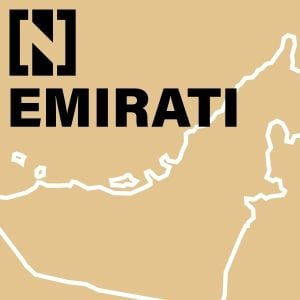When the Gulf War ended in 1991, my friends and I started thinking about our future and the career paths we wanted to take. For many, the goal was to join the armed forces because, after the conflict, it was considered an important role for the country, it paid well and it was appreciated by the government.
The reason why so many men and women chose that path was because back then, apart from the oil industry, it was all that was available for new entrants to the workforce. There weren't many pilots, engineers or teachers because the notion of going to college and being a graduate was still new to the country.
Most of the time, Arabs follow their role models or heroes into their chosen career paths, whether it's their father, a famous leader or a beloved teacher.
For me, my father was my hero. He had a senior role at the ministry of education and my mother was the principal of a school, but I never felt I wanted to be a teacher.
At school, I didn't like memorising and the majority of our studies were based on memorising, which was horrible for me because I was not at all perfect at science or literature, where you need to remember a lot. Instead, I was more street smart.
Exams were never my strong point; I always came to life when the teacher asked a question and I was the student asking another question in return. That's what creates debate and dialogue but at the time it didn't help me decide which direction to take.
So I went to my father and asked him what he thought I would do in the future. He asked what I felt like doing and I replied: "I want to be like you."
This was a surprise for him because he knew I did not want to go into the education sector, but what I meant was that I wanted to be respected by others in the same way he was. Because of his senior position, he often did radio interviews and was a very charismatic speaker who never needed to prepare; he just did it on the spot.
At the time it never occurred to me that I may take those genetic qualities and use them in my own future. Instead I was frustrated by all the studying I had to do for maths. I remember turning to my father, who regularly helped my three sisters and I do our homework, and asking him why I had to memorise all these sums.
He replied: "The human body is designed to be hungry and in the same way, your heart and your brain are also hungry for knowledge. If you don't feed that hunger you will never feel satisfied."
He went on to tell me how humans are inspired by the beautiful scenery around us, such as the mountains, the clouds and the sunset and sunrise we see everyday. They inspire us to travel and explore the world and to appreciate what God has created and that is why we need knowledge.
He also told me that one day my younger sister would ask me the same question and when she did, I would have the answer.
And he was right, because as I continued my studies, I eventually found my way.
This came about when I was invited to represent the UAE in a Gulf table tennis championship in Qatar. To take part I needed permission from the Ministry of Education to have leave from school.
At the time I was in thani thanaway - the second year of high school - when my studies were focused purely on science.
Even though I had a problem with maths, I'd chosen science over the literature option because I believed it was more prestigious and people would consider me more intelligent.
It was a hard year and going to the tournament just before my exams was a critical time but my father left the decision to go or not up to me.
When I came back I had a few days before the exams and, although I passed, there were a couple of subjects I did not do as well in and I knew I may struggle to pass the final year of high school.
So I took a decision to move to literature, right in the middle of the two-year course. It was a big challenge - going from one extreme to another - but I managed to do well.
That change in direction all those years ago is what took me to where I am today.
Today I am an entrepreneur and while I may deal in numbers, I am not the one watching every penny; I'm the man who talks and writes and asks the questions.
As I mentioned earlier I never realised I would one day be a writer or a speaker. There was a time when memorising classic Arabic poetry was just not for me.
Now I write poems, I speak and I write my books and columns. I didn't know I would be a writer; I'm just a person who is passionate about what I do and, more importantly, has a passion for knowledge.





